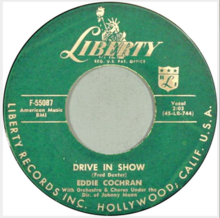
Vincent Eugene Craddock, known as Gene Vincent, was an American musician who pioneered the styles of rock and roll and rockabilly. His 1956 top ten hit with his Blue Caps, "Be-Bop-a-Lula", is considered a significant early example of rockabilly. He was inducted into the Rock and Roll Hall of Fame and the Rockabilly Hall of Fame. He is sometimes referred to by his somewhat unusual nickname/moniker The Screaming End.
Rockabilly is one of the earliest styles of rock and roll music. It dates back to the early 1950s in the United States, especially the South. As a genre it blends the sound of Western musical styles such as country with that of rhythm and blues, leading to what is considered "classic" rock and roll. Some have also described it as a blend of bluegrass with rock and roll. The term "rockabilly" itself is a portmanteau of "rock" and "hillbilly", the latter a reference to the country music that contributed strongly to the style. Other important influences on rockabilly include western swing, boogie-woogie, jump blues, and electric blues.
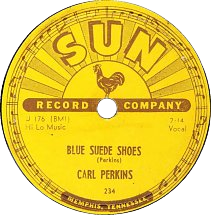
"Blue Suede Shoes" is a rock-and-roll standard written and first recorded by Carl Perkins in 1955. It is considered one of the first rockabilly records, incorporating elements of blues, country and pop music of the time. Perkins' original version of the song appeared on the Cashbox Best Selling Singles list for 16 weeks and spent two weeks at the number two position.

"Summertime Blues" is a song co-written and recorded by American rock and rockabilly artist Eddie Cochran. It was written by Cochran and his manager Jerry Capehart. Originally a single B-side, it was released in August 1958 and peaked at number 8 on the Billboard Hot 100 on September 29, 1958 and number 18 on the UK Singles Chart. It has been covered by many artists, including being a number-one hit for country music artist Alan Jackson, and scoring notable hits in versions by Blue Cheer, The Who, and Brian Setzer, the last of whom recorded his version for the 1987 film La Bamba, in which he portrayed Cochran. Jimi Hendrix performed it in concert.
"Have I Told You Lately That I Love You?" is a popular song written by Scotty Wiseman for the 1944 musical film, Sing, Neighbor, Sing and performed by Lulu Belle and Scotty. It was the greatest hit of Wiseman and his wife and one of the first country music songs to attract major attention in the pop music field. Its repeating fourth line is "Well darling, I'm telling you now." Although it was featured in the movie, it wasn't released by them until 1947. The first released version of this song was by Gene Autry in 1945.
"Poor Little Fool" is a song written by Sharon Sheeley and first recorded by Ricky Nelson in 1958.
"This Can't Be Love" is a show tune and a popular song from the 1938 Rodgers and Hart musical The Boys from Syracuse when it was sung by Eddie Albert and Marcy Westcott. The lyrics poke fun at the common depiction of love in popular songs as a host of malignant symptoms, saying, "This can't be love because I feel so well."

"Twenty Flight Rock" is a song originally performed by Eddie Cochran in the 1956 film comedy The Girl Can't Help It, and released as a single the following year. The song was published in 1957 as written by Ned Fairchild and Eddie Cochran, by American Music Incorporated and Campbell, Connelly and Company. Cochran's contribution was primarily on the music. His version is rockabilly-flavored, but artists of many genres have covered the song.
Jerry Neil Capehart was an American songwriter and music manager. Capehart co-wrote the songs "Summertime Blues" and "C'mon Everybody" with Eddie Cochran, whom he also managed. One of his most-recorded songs, "Turn Around, Look at Me," was a chart hit for Glen Campbell, the Lettermen, and the Vogues.
"Am I Blue?" is a song copyrighted by Harry Akst (music) and Grant Clarke (lyrics) in 1929 and then featured in four films that year, most notably with Ethel Waters in the movie On with the Show. It has appeared in 42 movies, most recently Funny Lady and The Cotton Club, and has become a standard covered by numerous artists.
"That's My Desire" is a 1931 popular song with music by Helmy Kresa and lyrics by Carroll Loveday.

"Cut Across Shorty" is a song written by Marijohn Wilkin and Wayne P. Walker, made popular by Eddie Cochran. It was the b-side of his number 1 UK hit "Three Steps To Heaven" and the last song he ever recorded.

"Glad All Over" is a 1957 song recorded by rock and roll and rockabilly artist Carl Perkins, "The Rockin' Guitar Man", at Sun Records in 1957. It was released as a 45 and 78 single, Sun 287, on January 6, 1958. It was written by Aaron Schroeder, Sid Tepper, and Roy Bennett.
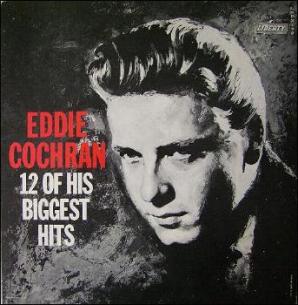
The Eddie Cochran Memorial Album is the second album by Eddie Cochran, released on Liberty Records in mono, LRP 3172, in May 1960. It had previously been issued as 12 of His Biggest Hits in April 1960 with the same catalogue number, but after Cochran's death on April 17 it was retitled and reissued, and has remained so titled ever since. It is currently in print on the Magic Records label in France, on CD on EMI-Toshiba in Japan, and on BGO in the UK as a twofer with "Singin' To My Baby."

Singin' to My Baby is the first album by Eddie Cochran, released on Liberty Records in mono in November 1957. The catalogue number was LRP 3061. It was the only album Eddie Cochran released during his short lifetime.

"Weekend" is a song recorded by Eddie Cochran. The song was written by Bill and Doree Post and recorded in April 1959.
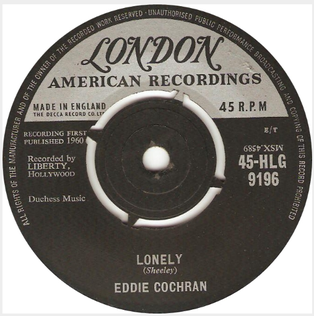
"Lonely" is a song written by Sharon Sheeley and recorded by Eddie Cochran. It was recorded in May 1958 and released posthumously as a single on Liberty F-55278 in August 1960. In the UK the single rose to number 41 on the charts. The U.S. release did not chart. The flip side, "Sweetie Pie", reached number 38 on the UK Singles chart.
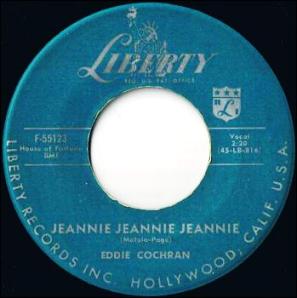
"Jeannie Jeannie Jeannie" is a song by Eddie Cochran recorded and released as a single in January 1958 on Liberty Records 55123. It was a minor hit for Cochran and stalled at number 94 on the Billboard charts. "Jeannie, Jeannie, Jeannie" was posthumously released in the United Kingdom in 1961 on the London Records label and rose to number 31. Later versions are most commonly known as "Jeanie, Jeanie, Jeanie". The song was first written as "Johnny, Johnny, Johnny" for The Georgettes, but they never recorded it.

"My Way" is a song co-written and recorded by Eddie Cochran. It was recorded in January 1959 and released posthumously as a single on Liberty Records in April 1963. In the UK the single reached number 23 on the charts.

"Sweetie Pie" is a song written by Eddie Cochran, Jerry Capehart, and Johnny Russell and recorded by Eddie Cochran. It was recorded in 1957 and released posthumously as a single on Liberty F-55278 in August 1960. In the UK the single rose to number 38 on the charts. The U.S. release did not chart. The flip side, "Lonely", reached number 41 on the UK singles chart. Keld Heich has recorded the song in 2010.
